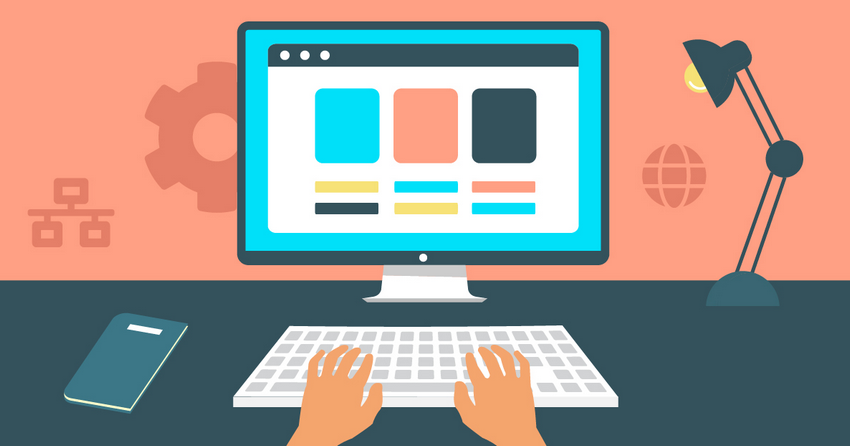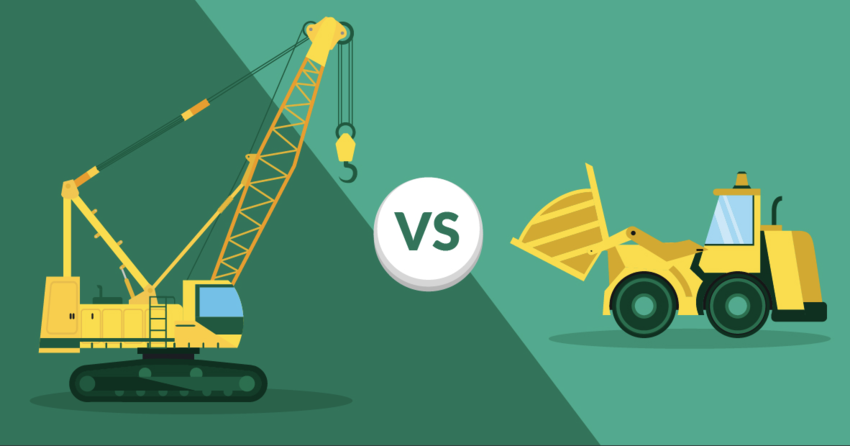Building a website should be easy, but not all builders make the process simple. After testing Web.com and Wix, I found that while both promise a simple setup, they take very different approaches – and the best choice depends on what you need.
Web.com gets you online fast with a structured, no-frills editor that keeps things straightforward. It’s excellent for beginners who want to build a clean, functional site without getting lost in too many choices. But if you need more creative control, you’ll quickly hit its limits.
Wix, on the other hand, lets you take complete control. With 2500+ templates, drag-and-drop editing, and an app store packed with add-ons, you can build exactly what you picture with Wix. There’s a bit of a learning curve, but Wix’s level of customization is hard to beat.
I prefer Wix for its flexibility, but Web.com’s simplicity might be better if you’re a beginner. Keep reading to see how they compare in e-commerce, blogging, SEO, and more.
Templates
Wix Offers More Templates and Creative Freedom Than Web.com
Wix gives you over 2500+ professionally designed templates across over 80 categories, while Web.com offers about 150+ templates with fewer category options. Both are mobile-friendly, but Wix’s range makes it easy to find a close match for any niche – whether a dog-walking service or a photography portfolio.
Web.com’s designs, on the other hand, feel like minor variations of color or imagery with the same overall structure. That means you’ll have to spend more time customizing to get the look you want.

Design flexibility is another major difference. Wix lets you adjust every part of a page – move sections, layer backgrounds, or tweak spacing and layout to your liking. Web.com keeps you fixed in a grid. You can swap images or edit text, but you can’t move elements like call-to-action buttons outside of predefined areas.
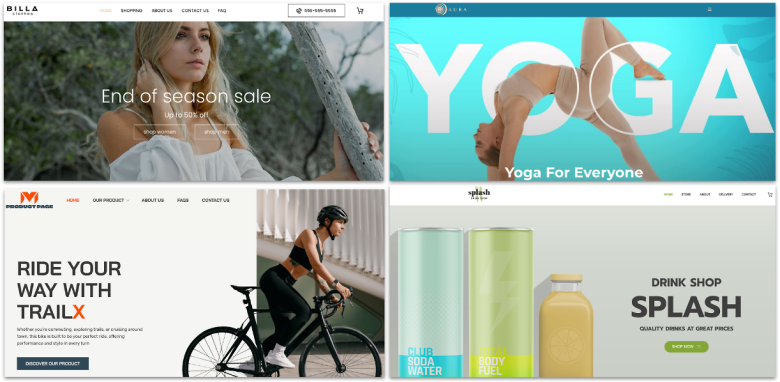
Neither platform lets you switch templates after you start editing, so you’ll need to start from scratch if you want a new look. However, Wix is the clear winner in this category, offering you far more variety upfront – so you’re more likely to find a design you won’t want to replace.
Features and Ease of Use
Wix Wins on Features and Customization, Web.com Keeps It Basic
You can build a fully customizable site with Wix’s drag-and-drop editor or you can use its AI builder to handle the basics for you. Web.com uses a simpler, point-and-click system that’s easier to learn but offers less flexibility. For example, it lacks responsive spacing that adjusts across screen sizes. I did like its Color Wizard – it matched my site’s colors to the logo, similar to Wix’s Theme Assistant.
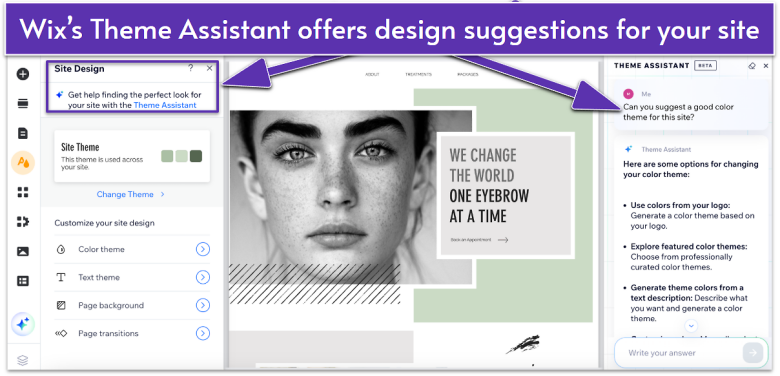
There’s a big difference in design tools, too. With Wix, you get widgets like video backgrounds, photo galleries, and booking calendars. Web.com sticks mainly to the basics: buttons, text, simple forms, and images. Storage is also more generous on Wix’s premium plans, which go up to unlimited, while Web.com’s range is between 10GB and 40GB.
When it comes to features beyond design, Wix includes built-in SEO guidance and its own email marketing service with both free and paid tiers. Web.com supports manual SEO edits but doesn’t offer native marketing tools. Web.com does edge out Wix on live support, with faster chat response times and longer phone hours. Wix, by contrast, relies more on chatbot help and scheduled callbacks.
If you’re after a basic website without fuss, Web.com gets the job done – and even includes a free 1-hour session with a design expert. But if you want a site that grows with you, Wix is the smarter pick.
Apps and Plugins
Web.com Has the Basics, but Wix Helps You Grow
Wix has a huge app marketplace with 800+ apps, while Web.com sticks to the essentials like contact forms, maps, and social buttons. If you need additional features on Web.com, you’ll have to embed third-party code manually. That said, Web.com does offer WordPress hosting, so you can use plugins if you go that route.
With Wix, you can upgrade your site instantly using apps for live chat, advanced forms, SEO boosters, memberships, and appointment booking. Many are free, while premium apps unlock extra features for a fee. Web.com lacks built-in tools for bookings, pop-ups, and e-commerce, which could be a dealbreaker if you’re building a more dynamic site.
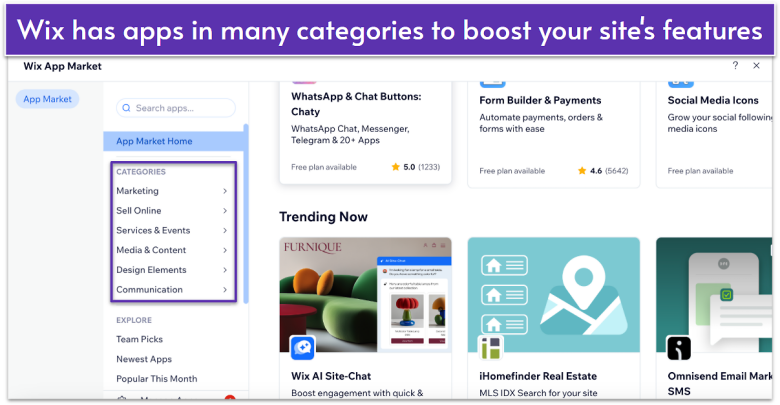
Overall, Wix gives you many more options to customize and scale your site without relying on custom code. Web.com feels more locked in by comparison, offering fewer ways to expand once your site is live.

E-Commerce
Wix and Web.com Offer Similar Store Features, But Wix Is the Better Deal
Selling online with Wix is easy. I tested its store setup and had products listed, inventory tracking enabled, and payments connected in minutes. Wix also helps you sell beyond your website by letting you list products on Instagram, Facebook, Amazon, and eBay from one dashboard, which is great if you want to expand your reach. It even handles tax calculations, shipping labels, and abandoned cart recovery.
With Web.com, you can create a mobile-responsive online store and sell on popular marketplaces like Etsy, Amazon, eBay, and more. You also get auto-tax calculations, custom discount codes, and abandoned cart recovery. However, Web.com only offers these features on its premium eCommerce plan, whereas Wix has them on its mid-tier Core plan that costs $29.00 a month.
Marketing
Wix Has Built-In Marketing Tools, While Web.com Leaves It to You
Unlike Web.com, Wix includes a built-in marketing suite for sending emails, posting on social media, and running Google and Facebook ads. Even on the free plan, you can send up to 200 emails a month, but automation and advanced tools require a paid plan. Web.com doesn’t offer any of this – just SEO fields and Google Analytics.
To run campaigns with Web.com, you’ll need third-party tools like Mailchimp or Ads Manager. It also promotes paid SEO services, which feel like an upsell rather than a core feature. If you’re serious about growing your brand, having everything built-in gives Wix a clear edge.
SEO
Wix Guides You Through SEO, Web.com Lets You Take Charge
When I built my test site, Wix’s easy SEO checklist guided me through every step, from setting page titles and alt text to linking my site with Google in just a few clicks. It even took care of technical details like structured data, saving me hours of work. If SEO makes your head spin, Wix feels like having a guide right beside you.
Web.com doesn’t hold your hand the same way, but it puts you in charge. During my tests, I could easily change meta tags and URLs exactly how I wanted. Its SEO Checker gave me clear tips for how to improve my site. Connecting to Google Analytics was simple too, helping me see traffic patterns and fix weak spots.
All in all, Wix gives you clear steps to follow and less to worry about basic SEO. But if you prefer doing SEO your way, Web.com has all the basics you need without getting in the way.
Pricing
Web.com Costs Less at First, but Wix Delivers Better Value Over Time
At first glance, Web.com’s pricing looks like a steal. For just $4.99, you get the site builder, a free domain for a year, and basic security features. However, once the introductory price ends, the renewal rates jump significantly. Features like business email, extra storage, and e-commerce tools come at an additional cost, making it more expensive over time than it initially seems.
Meanwhile, Wix starts for free and lets you upgrade when you’re ready. For $17.00, you can remove Wix ads and connect your own domain. The Core plan adds analytics and extra storage at $29.00. The Business plan costs $39.00 and has everything you need for an online store, while the Business Elite plan throws automation tools into the mix for $29.00.
I like how upfront Wix is about its pricing – there are no hidden fees or price increases at renewal. Compared to Wix, Web.com’s pricing can feel like a slow-creeping expense.
Here’s What You Get for Free
With Wix, you can build and publish a site for free and take your time fine-tuning it. You get access to the full template library, drag-and-drop editor, advanced design tools, and all customization features. However, your site will have Wix branding and use a Wix subdomain, but it will stay live with no time limit.
Unfortunately, Web.com doesn’t have a free plan, but you can try it risk-free with its 3-day money-back guarantee.
Here’s What You Get If You Pay
Wix’s paid plans include a free domain for 1 year. The Light plan removes Wix ads and lets you connect a custom domain. Upgrading to the Core plan adds visitor analytics, more storage, and access to essential e-commerce tools, making it a solid choice for growing businesses.
If you’re selling online, you’ll need at least Wix’s Business plan, which unlocks shopping carts, inventory tracking, automated sales tax calculations (up to 100 transactions per month), and multi-currency support. Meanwhile, the top-tier Business Elite plan comes with unlimited storage space and priority customer support.
All Wix plans include SEO tools, a free domain for 1 year, access to Wix’s support center, and a 14-day money-back guarantee. Wix includes fully managed cloud hosting with all sites, using AWS and Google Cloud for scalability. Its Studio and Enterprise plans support larger projects, but VPS hosting isn’t available.
Web.com starts at a low price, but prices jump after the first month. The Website plan covers design flexibility, basic site tools like the SEO Checker, and a free domain for a year, but branding and e-commerce features are locked behind higher tiers. The eCommerce plan has store management tools and product listings. Web.com also offers managed WordPress hosting for more flexibility, but doesn’t provide VPS options.
For a quick comparison of some key plan features, here’s a breakdown of each builder’s starter plan.
| Wix | Web.com | |
|---|---|---|
| Starting Price | $17.00 | $4.99 |
| Templates | 2500+ | 150+ |
| Custom Domain | ✔ (free for 1 year) | ✔ (free for 1 year) |
| App Marketplace | ✔ | ✘ |
| Type of Editor | Drag-and-drop – full design freedom | Drag-and-drop – limited customization |
| Marketing Tools | ✔ | ✘ |
| E-Commerce | ✘ (starts from the Core plan) | ✘ (only on Elite plan) |
Support
Web.com Offers Faster Human Support, Wix Has Better Self-Help Resources
If you like quick, personal help, Web.com’s 24/7 live chat support is pretty responsive. When I asked about migrating to WordPress, the representative responded quickly, but I had to push for more details about what content could be transferred. The information didn’t come automatically, and I had to engage in a bit of back-and-forth. If you’d rather not do that, you can contact phone support from 7 a.m. to midnight ET.
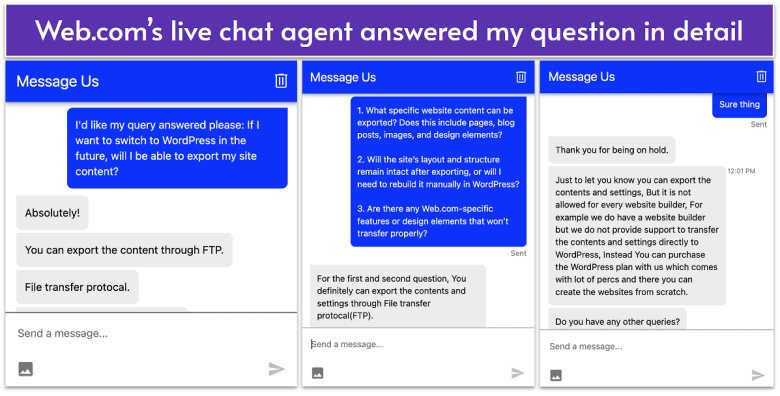
Wix also offers help around the clock, but getting someone on the phone can take longer. When I tested its callback service, it wasn’t as quick as promised, though the agent answered my site migration questions clearly. Wix’s chatbot was helpful for basic queries, and when it couldn’t provide an answer, it connected me to a live agent.
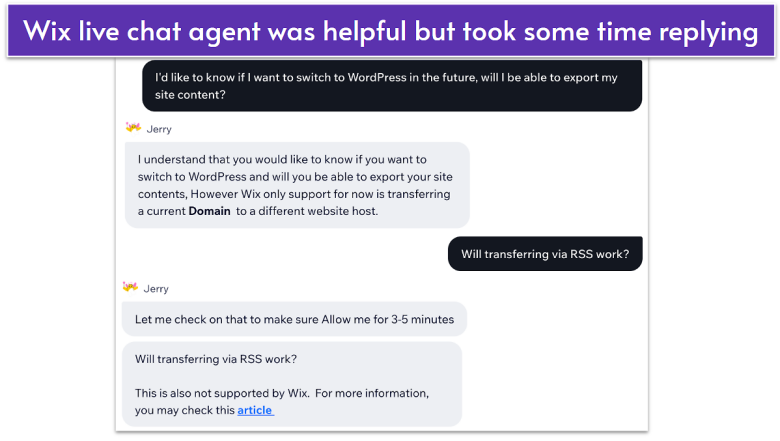
Overall, I didn’t have a bad support experience with either builder. Web.com’s support agent was much quicker in answering me, while Wix’s chatbot is great if you have general questions. You can also consult Wix’s extensive Knowledge Base, which has lots of easy-to-follow guides and articles.
Web.com vs Wix – Wix Is Better Overall
Based on my tests, both builders make it easy to get online. If your goal is to launch a site quickly, Web.com does the job. Its tools are easy to use, and you’ll get access to direct, personal support anytime you need it. However, Wix gives you far more freedom, a broader range of tools, and greater potential for long-term growth.
With Wix, you have complete control over your site’s design through its drag-and-drop editor, hundreds of modern templates, and a host of built-in features. It comes loaded with email marketing, powerful SEO help, and an app store full of add-ons that Web.com simply can’t match. Plus, you can expand into e-commerce whenever you’re ready without starting from scratch.
Web.com is a good fit if you want a simple website with minimal setup. Its Quickstart wizard builds your site automatically, and you get essentials like contact forms, SSL, and a free domain. The limited template selection and fewer customization options might limit long-term growth, but it’s a good fit for small service-based businesses or users who prioritize live chat support and don’t require advanced features.
Here’s a side-by-side comparison of Wix and Web.com’s key features.
FAQ
What are the main differences between Web.com and Wix?
Wix offers more design options, flexibility, and room to grow. It offers 2500+ templates, a completely customizable drag-and-drop editor, and a vast app marketplace with hundreds of plugins. Unlike Web.com, it also has a free forever plan, but Wix’s paid plans are more costly than Web.com’s.
Which platform is better for small business e-commerce, Wix or Web.com?
Wix is the better choice for e-commerce. It lets you sell physical and digital products, manage inventory, and accept payments through PayPal, Stripe, and offline methods. You can even sync your store with Instagram, Facebook, Amazon, and eBay. Web.com covers the basics, but it lacks multi-channel selling, abandoned cart recovery, and deeper marketing integrations.
Should you choose Web.com or Wix for your website?
If you want a website that can grow with you, Wix is the way to go. It gives you 2500+ templates, full creative freedom with its drag-and-drop editor, and an app store packed with extra integrations. Web.com is easier to use and starts cheaper, but it’s more limited in design and flexibility. If you’re after a simple site, Web.com works – but for long-term potential, Wix is better.
Which is better suited for beginners, Web.com or Wix?
Web.com is the simpler choice for beginners since its editor keeps things structured and easy to follow. It gives you just enough customization to make your site feel personal without drowning you in options, which is good if you have no clue how to build a website. Wix is also beginner-friendly, but its endless design choices can feel overwhelming at first.







